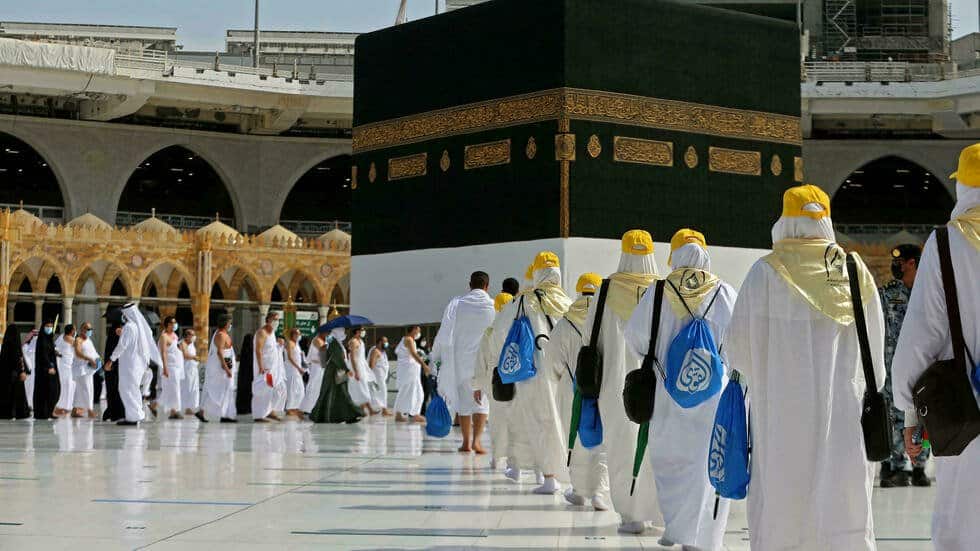-
Up to 60,000 Muslims residing in Saudi Arabia are allowed to take part in this year’s hajj
-
Through an online vetting system, they were chosen from more than 558,000 applicants
An Indian family-of-five burst into tears of joy after being chosen for this weekend’s downsized hajj pilgrimage in Saudi Arabia, but hundreds of thousands of rejected applicants were left disappointed.
Up to 60,000 Muslims residing in Saudi Arabia are allowed to take part in this year’s hajj, evoking the envy and awe of millions of international pilgrims who have been barred for the second year due to the coronavirus pandemic.
Through an online vetting system, they were chosen from more than 558,000 applicants — all citizens or residents of the kingdom.
The annual ritual is a central pillar of Islam and a must for able-bodied Muslims at least once in their lifetime.
Among the chosen ones was Ameen, a 58-year-old Indian oil contractor based in the eastern city of Dammam, who was picked for the ritual along with his wife and three adult children.
“We are overjoyed,” said Ameen, who only gave his first name.
“So many of our friends and relatives were rejected,” he told AFP.
The five-day pilgrimage, which starts on Saturday, is confined to residents of the kingdom who have been fully vaccinated and are aged 18-65 with no chronic illnesses, the hajj ministry said.
The chosen pilgrims come from 150 countries, with a preference given to those performing the ritual for the first time, it added.
“I feel like I won a lottery,” Egyptian pharmacist Mohammed El Eter said after being selected.
“This is a special, unforgettable moment in one’s life. I thank God for granting me this chance, to be accepted among a lot of people who applied,” the 31-year-old told AFP.
‘Profoundly saddened’
The hajj ministry also received anguished queries on Twitter from rejected applicants about the tightly-controlled government lottery.
“We are still anxiously waiting to be accepted, as though we’re facing an exam,” wrote one Twitter user.
All Muslims are expected to complete the hajj to the holy city of Mecca at least once in their lives if they have the means to do so.
Believers converge on the city for several days of rituals in which they retrace the Prophet Mohammed’s last pilgrimage.
In a hugely sensitive decision last year, Saudi authorities hosted the smallest hajj in modern history to prevent it from becoming a super-spreader event for the deadly virus.
Authorities initially said only 1,000 pilgrims were allowed last year, but local media said up to 10,000 took part.
Though a higher number of pilgrims were chosen this year, it is still a far cry from the 2.5 million who participated in 2019 from around the world.
“I am profoundly saddened,” Pakistani clothes merchant Zafar Ullah, 64, told AFP after Saudi Arabia announced it was barring international pilgrims.
“I also wanted to go for hajj last year. I was desperately hoping to make it this year and even had got myself vaccinated along with my wife.”
‘Move closer to God’
Even among the chosen pilgrims, some complained of the high cost of the ritual. Government hajj packages start from around 12,100 riyals ($3,226), excluding a value added tax.
Last year, worshippers said the Saudi government covered the expenses of all pilgrims, providing them with meals, hotel accommodation and health care.
But despite the cost, applicants say that to be among the chosen ones adds an aura of religious prestige to the pilgrimage.
Amid the pandemic, many pilgrims consider it is safer to participate in a smaller ritual without the usual colossal crowds cramming into tiny religious sites creating a logistical nightmare and a health hazard.
Even in a regular year, the hajj leaves pilgrims exposed to a host of viral illnesses.
“My feelings cannot be described,” said Rania Azraq, a 38-year-old Syrian housewife in Riyadh, who will attend the hajj without a male guardian, once mandatory for female pilgrims.
“You just want to cry… and move closer to (God).”








